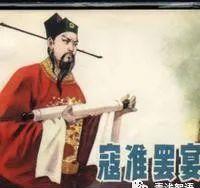I inadvertently read this extremely entangled grievance and found that the author was actually Kou Zhun, a famous minister of the Northern Song Dynasty. Who is Kou Zhun? Isn't it Kou Lao Xi'er? Is the civil official who has seven tricks in Liu Lanfang's commentary, is extremely intelligent, and upright?
Many people first met Kou Zhun, probably like me, starting from the Yang family review, right? When Liu Lanfang's commentary swept the country, the story of "Kou Zhun Strike Banquet, Kou Zhun Back Boots" was familiar, and the wise and humorous Kou Laoxi'er was deeply rooted in the hearts of the people.

I have never been very interested in history, and I became interested in Kou Zhun because of this song, and traced Kou Zhun's political career and found that he was really a very powerful character.
In the "Yang Family General", which is widely circulated, Kou Zhun not only gave advice for the Yang family generals, but also carried many pots for them, and like the Eight Sages, he was the strong backing of the Yang family soldiers to gallop on the battlefield. His role in the book is deeply loved by the people, but his meritocracy and contribution to the government are only a peeping leopard, and his story only tells the tip of the iceberg.
Kou Zhun was one of the most accomplished ministers during the Song Zhenzong period, he had a straight personality, dared to be a direct advisor, was good at governing the country, and most importantly, Kou Zhun tried to turn the tide when the Khitan was going south and the government and the opposition were in a panic, stabilizing the hearts of the army, and persuading Song Zhenzong to personally march, thus making Liao and Song sign the "Alliance of Yuanyuan".
He has a very good reputation in the government and the public, and he also has a large number of fans in the folk. How long has the story of the Yang family been circulating, and how deeply the image of Kou LaoXi'er has been deeply rooted in the hearts of the people. Zhao Guangyi even praised him: "Emperor Yuwen of Yuwen has won Wei Zhengye."
Not only did he have the talent for reasoning, but he did not understand the emperor, had a long-term vision, adhered to principles, and indeed had all the advantages that an official should have, and it was such an excellent official who could not escape the fate of being excluded and degraded.
In 991, the second year of Emperor Taizong of Song's reign, Kou Zhun was demoted to the prefect of Qingzhou, and during his tenure, in order to express his bumpy career, as well as his inseparable feelings for junshang in the political arena and his own loss, he wrote the poem "Spring Twilight".
Borrowing women's grievances to express their depression is a common disease of the literati in the old times, and the words are written sincerely and lyrically, and the lyricism is just right. Later, Kou Zhun was summoned to Beijing again, and then reused, writing this song is probably a small episode!
Kou Zhun was not only an official and a well-known official, but also an outstanding literati, and his lyrics were also passed down through the ages. At present, there are 304 poems of his poetry that have been handed down, and fang also circulates the story of his three-step poem, and at the age of seven, he sang Huashan with three-step poems: only the sky is on the top, and there is no mountain and Qi. Raise your head to the red sun approaching, look back at the low white clouds.
Thinking that this five-word poem was conceived by a seven-year-old child within three steps, I can't help but sigh that the Northern Song Dynasty is really a dynasty of individuals, and among the eight masters of the Tang and Song Dynasties, the Northern Song Dynasty accounts for six.
In the nine years of compulsory education, I was scolded by many teachers for not being able to recite their works, and today I actually know that even the funny and funny Kou Laoxier is a prodigy of three-step poetry, which once again refreshes the height of my admiration for the literati of the Northern Song Dynasty.
When I was a child, I only thought that Kou Zhun was a little clever, but now it seems that the great wisdom of others has also left a strong mark on the stage of history.
Yes, by the way. Kou Zhun is not from Shanxi, his ancestral home is Shaanxi, because he once served in Taigu, Shanxi, so he was known as Kou Laoxier.